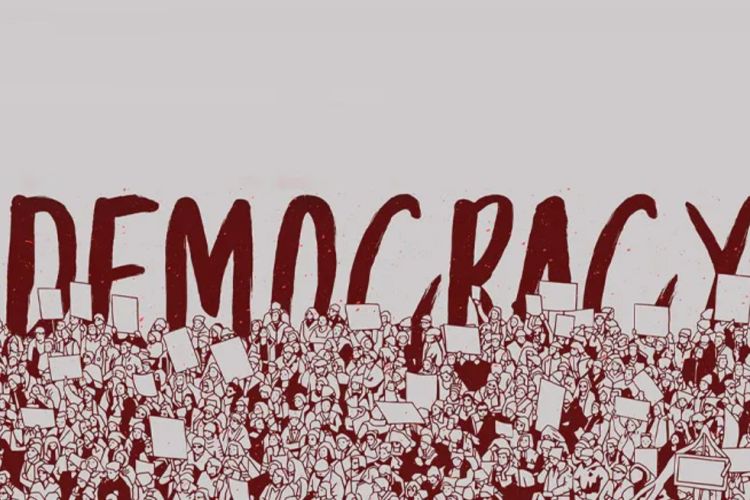As the world looks ahead to 2025, the state of global democracy presents a dichotomy: tested yet enduring, battered yet resilient. Reports from diverse regions highlight both the immense challenges facing democratic systems and their remarkable ability to adapt and survive. The year-end is an opportune time to analyse global trends, exploring the triumphs and tribulations of democracy in a period marked by economic instability, political polarisation, and the rise of disinformation.
Democracies across the world have weathered a tumultuous year. Elections in 2024 covered 60% of the world’s population and were marked by violence and uncertainty. Yet, they achieved a core democratic function: the peaceful transfer of power. Incumbent governments in South Africa, India, and Britain faced setbacks, reflecting a healthy electoral accountability. Mexico saw its bloodiest election season but emerged with its first woman president, Claudia Sheinbaum—a historic milestone.
READ | Manmohan Singh: The quiet statesman who reshaped India’s economic future
These moments reveal democracy’s resilience. Even when tested by violence or political brinkmanship, democratic institutions often provide a mechanism for renewal. In South Korea, an attempted imposition of martial law was swiftly overturned by public outrage and parliamentary action. In Bolivia and Bangladesh, public protests and judicial interventions upheld democratic principles, preventing autocratic overreach.
Rising authoritarianism and disinformation
Despite these successes, the shadow of authoritarianism looms large. Autocracies in Russia, Iran, and Venezuela grew more repressive, staging elections that deprived voters of meaningful choices. In West Africa, military coups, fuelled by Islamist insurgencies and economic despair, erased years of democratic progress.
A significant enabler of this backslide is the growing sophistication of disinformation campaigns. Reports highlight how foreign actors exploit social media to propagate narratives portraying democracy as a Western-imposed failure. This manipulation resonates in regions like the Sahel, where disillusionment with weak democratic institutions opens the door to authoritarian alternatives.
The international community must respond decisively. Strengthening democratic institutions requires safeguarding the information space from disinformation. Initiatives like the “fence framework,” which combines data collection, cross-sector collaboration, and targeted public communication, provide a roadmap for defending democracy against manipulation.
Economic pressure and populism
Economic instability, created by the pandemic, slow growth, and ageing populations, has placed democracies under immense strain. In the G7 nations, fiscal challenges have destabilised governments, fuelling political polarisation. France’s government fell over budget battles, and Germany’s coalition collapsed under similar pressures. Canada faces political turmoil as economic dissatisfaction grows, while Japan grapples with declining public trust in its ruling party.
These pressures have bolstered populist movements. Far-right parties gained ground across Europe, with Germany’s AfD receiving overt support from influential figures like Elon Musk. In the US, Donald Trump’s return to power signals a shift in political dynamics, with his populist rhetoric challenging traditional democratic norms.
However, the rise of populism also serves as a warning for democracies to address underlying grievances. Economic inclusion, social equity, and effective governance are essential to counter the allure of authoritarian solutions.
Africa: Democracy’s battleground
Africa represents both the challenges and opportunities for democracy. While satisfaction with democracy has declined, it remains the continent’s most popular governance system. Military juntas in Mali, Burkina Faso, and Niger initially found support by promising stability, but their failure to deliver on economic and security goals has eroded public trust.
The lessons are clear: democracy’s survival depends on tangible benefits for citizens. Governments must prioritise good governance, economic opportunity, and social inclusion to restore faith in democratic systems. Efforts to counter disinformation and strengthen electoral integrity will also be crucial.
Democracy’s moment of reckoning
As the world enters 2025, fewer elections are scheduled, but the stakes remain high. Germany’s parliamentary election will test the resilience of democratic norms in the face of rising far-right populism. In the US, Donald Trump’s second term will be closely watched for its implications on press freedom, judicial independence, and international alliances.
Meanwhile, revolutions in Bangladesh and Syria offer both hope and caution. In Bangladesh, Nobel laureate Muhammad Yunus’s interim government must find the delicate path of electoral reform, while Syria faces the daunting task of rebuilding from civil war under the leadership of Islamist rebels.
To ensure democracy’s future, governments, civil society, and international organisations must act decisively. Strengthening institutions, addressing economic disparities, and defending the information space are non-negotiable imperatives. Ultimately, democracy’s greatest strength lies in its ability to adapt and endure.
The reports collectively paint a picture of democracy at a crossroads — buffeted by crises but far from defeated. The challenges are undeniable, from disinformation and economic instability to the rise of populism and authoritarianism. Yet, the enduring appeal of democracy, rooted in its principles of accountability, inclusion, and liberty, remains a powerful force.
For democracy to thrive, it must deliver on its promises. Citizens must see tangible improvements in their lives, and governments must demonstrate that democratic governance is not only the most just system but also the most effective. The future of the world’s democracies depends on this delicate balance between resilience and renewal.

